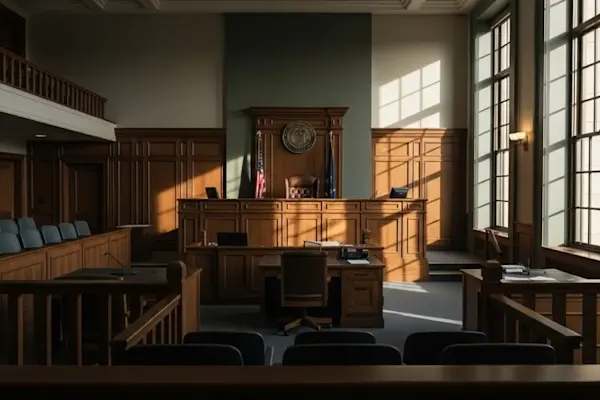Common Law Divorce: The Legal Myth That Confuses Colorado Couples
You lived together for eight years, shared expenses, filed taxes jointly, and introduced each other as husband and wife to everyone you knew. Now the relationship is ending, and you figure you'll just go your separate ways since you never had a formal wedding ceremony. After all, if there's "common law marriage," there must be "common law divorce," right?
Here's the shock: there's no such thing as common law divorce in Colorado, and walking away without a formal legal divorce could create serious problems that haunt you for years.
The Dangerous Misconception About Common Law Relationships
Most people believe that informal relationships end informally. They assume that if you never went through the ceremony and paperwork to get married, you don't need the ceremony and paperwork to get
This assumption causes real legal nightmares when these same people try to remarry, apply for benefits, or discover they're still legally married to someone they haven't spoken to in a decade.
What "Common Law Divorce" Actually Means (Spoiler: Nothing)
There is no such thing as common law divorce in Colorado. The term itself is legally meaningless. Spouses who have a common law marriage are legally married under the law, and dissolving the marriage requires a formal dissolution of marriage proceeding in a Colorado family court—exactly the same process as any other divorce.
Think about it this way: "common law" describes a way of getting into a marriage without a ceremony or license. It does not describe a way of getting out of one. Colorado law recognizes an informal path to marriage, but there is no informal path to divorce. Once you're married—whether through a ceremony at the courthouse or through mutual agreement and holding yourselves out as married—you need a legal divorce to end it.
Why This Matters More Than You Think
While Colorado law allows for common-law marriage, there is no provision for a "common-law" divorce. This is because a common law marriage is the same as a ceremonial marriage. You can't just walk away from a common-law marriage and assume that it is over without undergoing a divorce. If you do, you might encounter legal issues in the future, such as if you try to marry someone else.
IF you were common law married and never got divorced THEN you're committing bigamy if you marry someone else.
IF you assumed your common law relationship just ended when you moved out THEN you might discover years later that you're still legally married.
IF your ex claims you were common law married and you dispute it THEN you'll need a court hearing to determine whether a marriage ever existed before you can move forward.
IF you're trying to claim Social Security or inheritance rights based on a common law marriage THEN you'll need to prove the marriage existed through court proceedings.
How Common Law Marriage Actually Works in Colorado
Colorado is one of the few states that still recognizes common law marriages, and it has done so since 1877. Understanding how you get into a common law marriage helps explain why you can't informally get out of one. A common law marriage is established when two people mutually consent to be married and then hold themselves out to the community as a married couple.

The Two Essential Elements
Under Colorado law, proving a common law marriage requires demonstrating two things: mutual consent or agreement of the parties to be married, and mutual and open assumption of a marital relationship. Both elements must be present. Living together alone doesn't create a marriage. Dating for decades doesn't create a marriage. Even calling someone your partner or significant other doesn't necessarily create a marriage.
What creates a common law marriage is the combination of agreeing between yourselves that you're married, and then acting like married people in your community. This means introducing each other as husband and wife, filing joint tax returns, using the same last name, referring to yourselves as married on legal documents, and generally conducting yourselves as a married couple would.
Common Myths About Common Law Marriage
Myth: Living together for seven years automatically makes you common law married.
Fact: There are no cohabitation requirements or time limits for a Colorado common law marriage. You could be common law married after living together for one month if you meet the legal requirements, or never be married despite living together for 30 years if you don't hold yourselves out as married. The amount of time a couple is together is inconsequential in the eyes of the state of Colorado.
Myth: Simply living together creates legal obligations like marriage.
Fact: Simply living together does not establish a common-law marriage, and there isn't a standard amount of time a couple must be together to qualify as common-law married. Couples who are clearly just dating could live together for 20 years or more and legally be romantically involved but unmarried. The key is intent and conduct, not duration.
Myth: Common law marriage is less legitimate than ceremonial marriage.
Fact: Common law marriage in Colorado is valid for all purposes, the same as a ceremonial marriage. Once established, it carries all the same legal rights, responsibilities, and consequences. There's no "marriage lite" version—you're either married or you're not.
Myth: You can end a common law marriage the same informal way you started it.
Fact: This is the big one, and it's completely wrong. A common law marriage can begin based on the conduct of the parties but cannot end based on the conduct of the parties. To end a common law marriage, you need to get a legal divorce through a court. The way you enter a marriage and the way you exit it are entirely different processes.
Why Colorado Requires Formal Divorce for All Marriages
The reason there's no such thing as common law divorce comes down to protecting both parties and ensuring clear legal status. Marriage creates significant legal rights and obligations regarding property, debts, inheritance, benefits, and parental responsibilities. Allowing marriages to end informally would create chaos and injustice.

The Legal Rights at Stake
Once you're married in Colorado—whether through common law or ceremony—you have legal rights to marital property, potential spousal support, inheritance rights, insurance benefits, Social Security benefits based on your spouse's earnings, and decision-making authority in medical emergencies. These rights don't disappear just because you stop living together or decide the relationship is over.
Dissolving a common-law marriage requires getting a formal divorce decree or decree of dissolution of marriage through the courts, which includes directives on spousal support, parental responsibilities, child support, debt allocation, property division, and other legal matters. Without this formal process, neither party has clarity about their legal status or obligations.
What Happens If You Just Walk Away
Some couples in common law marriages simply separate and assume they're no longer married. They move on with their lives, sometimes for years or even decades. Then one of several scenarios unfolds that reveals the continuing legal marriage:
One person tries to marry someone else and discovers they're committing bigamy because they're still legally married to their first spouse. This happened to real people: one woman lived with someone for 15 years, both holding themselves out as married, then she married someone else without getting divorced from her common law spouse. Her second marriage was invalid, and she had to divorce her first common law spouse and remarry her second husband to fix the situation.
One person dies, and disputes arise about inheritance, life insurance, or retirement benefits because there's confusion about whether a surviving partner was actually a spouse with inheritance rights. The burden falls on the surviving partner to prove a common law marriage existed, often years after the relationship began.
One person applies for Social Security or other benefits based on the relationship and must prove a common law marriage existed. The Social Security Administration requires evidence that the marriage was valid, and without a formal divorce of any previous common law marriage, benefits can be denied.
The Actual Process for Ending a Common Law Marriage
If you were in a common law marriage in Colorado, you must file for divorce just like any other married couple. There's no shortcut, no simplified process, and no "common law divorce" option. The divorce process is identical whether you had a ceremony at a church with 300 guests or simply agreed between yourselves that you were married.
When Everyone Agrees You Were Married
If both parties acknowledge that a common law marriage existed, the divorce proceeds straightforwardly through Colorado's standard dissolution of marriage process. You'll need to file a Petition for Dissolution of Marriage, serve your spouse, complete financial disclosures, reach agreements or have the court decide issues like property division and support, and obtain a final decree from the judge.
The 91-day waiting period applies. Financial disclosure requirements apply. All the rules about equitable distribution of property, determination of child custody and support, and consideration of spousal maintenance apply exactly as they would for any other divorce. The court doesn't care how you got married—only that you are married and now seeking to dissolve that marriage.
When Someone Disputes the Marriage Existed
Here's where things get complicated. Because couples in common law marriages typically don't have a marriage certificate or formal ceremony to prove their union, disputes can arise about whether a marriage ever existed. One person in the relationship might claim they were married while the other insists they were just living together.
Before granting the divorce, the family law court must first resolve whether a marriage even exists. The court will hold an evidentiary hearing where both parties testify, present witnesses, and provide evidence. The person claiming a common law marriage exists bears the burden of proving it.

Evidence Courts Consider
Colorado district courts look at various types of evidence to determine if a common law marriage existed. The determination turns on issues of fact and credibility, meaning judges evaluate the believability of witnesses and the strength of evidence presented.
Evidence might include how the couple referred to each other in public and private, whether they used terms like "husband" and "wife," tax returns showing filing status as married, insurance policies listing the other person as a spouse, joint bank accounts, jointly owned property, testimony from friends and family about how the couple presented themselves, signed affidavits or documents where they identified as married, whether they wore wedding rings, and whether they had children together and how they described their family structure.
The court considers all evidence together—there is no single element that proves or disproves a common law marriage. Judges scrutinize these cases closely, making sure common law marriages are not self-serving, meaning couples only claim common law marriage when it's convenient for them and claim to be single otherwise.
What If You're Not Sure Whether You Were Common Law Married
This uncertainty keeps family law attorneys busy. Many couples fall into a gray area where they're genuinely unsure whether their relationship constituted a common law marriage. Maybe you called each other husband and wife sometimes but not always. Maybe you filed taxes jointly one year but separately the next. Maybe you introduced yourselves as married to some people but not others.
Unfortunately, it is not possible to definitively say if someone is common law married without a court or agency decision, usually done as part of a divorce or probate case. If you're ending a relationship and there's any possibility you might have been common law married, you need to address this question head-on rather than hoping it goes away.
The Risks of Ignoring the Question
IF you assume you weren't married and years later your ex claims you were THEN you could face a divorce proceeding a decade after you separated.
IF you marry someone new without divorcing a potential common law spouse THEN your new marriage could be invalid and you could face bigamy accusations.
IF your ex tries to claim marital property or support years after separation THEN you'll wish you'd resolved the marriage question immediately.
IF you need to prove you were common law married for benefits purposes THEN waiting years makes gathering evidence much harder.
The smart approach is consulting with a family law attorney when ending any long-term relationship where you lived together and held yourselves out as married in any way. An attorney can evaluate whether a common law marriage likely existed and advise you on whether you need to file for divorce to protect yourself legally.
The Process You Actually Need: Regular Divorce
Once you accept that there's no such thing as common law divorce and you need a formal dissolution of marriage, the process follows Colorado's standard divorce procedures. This means meeting residency requirements, filing a petition, serving your spouse, completing mandatory financial disclosures, resolving issues through negotiation or court hearings, and obtaining a final decree.
Timeline and Requirements
The same 91-day waiting period applies to divorces involving common law marriages. The court cannot finalize your divorce until at least 91 days have passed from when the court acquired jurisdiction over your case. This cooling-off period exists for all divorces regardless of how the marriage was formed.
Financial disclosures must be completed within 42 days. Both spouses must list all income, assets, debts, and expenses on mandatory Colorado forms.
This requirement exists to ensure transparency and fair property division—the court needs to know what marital property exists before deciding how to divide it.
Property division follows equitable distribution principles. Colorado courts divide marital property fairly based on various factors including length of marriage, economic circumstances of each spouse, contributions to the marriage both financial and non-financial, and future earning capacity.
For common law marriages, determining when the marriage began can significantly impact property division since only property acquired during the marriage is typically subject to division.
Special Complications with Common Law Marriage Divorce
Proving when your marriage began affects what property counts as marital versus separate. If you lived together for five years before actually forming a common law marriage, property you acquired during those first five years might be separate property rather than marital property subject to division.
But determining exactly when your common law marriage began requires evaluating when you both agreed to be married and started holding yourselves out as married.
Child custody and support follow the same standards as any divorce. If you have children together, the court determines parenting time and decision-making responsibilities based on the best interests of the child. Whether your marriage was common law or ceremonial makes no difference in custody determinations.
Spousal support may be available. The myth that common law marriages don't involve alimony is completely false. If one spouse needs financial support after the marriage ends and the other spouse has the ability to pay, the court can order maintenance using the same factors as any other divorce case.

How to Protect Yourself Going Forward
Whether you're currently in a relationship that might be a common law marriage, ending a relationship where marriage status is unclear, or planning your future after discovering you need a formal divorce, several steps protect your legal interests.
If You're in a Relationship Now
Be intentional about whether you want to be married or not. If you don't want to be married, don't hold yourselves out as married to others. Don't file joint tax returns as married, don't introduce each other as spouses, don't sign documents listing yourselves as married, and make your status clear to friends and family.
If you do want to be married, consider getting a marriage license and having a formal ceremony even if you've already established a common law marriage. Having clear documentation prevents future disputes about marriage status and makes everything simpler if you later divorce or when dealing with estates, benefits, and legal matters.
If You're Ending a Relationship
Consult with a family law attorney immediately if there's any possibility you might be common law married. Don't assume you can just walk away because you didn't have a formal wedding. An attorney can evaluate your situation and advise whether you need to file for divorce.
If you're unsure whether a common law marriage existed, address this question through legal channels rather than hoping it never comes up. Either file for divorce if marriage seems likely, or get legal advice about documenting that no marriage existed to protect yourself if your ex later claims you were married.
If You Discover You Need a Divorce
Don't panic, but don't delay. The fact that you've been separated for years doesn't change that you need a formal divorce if you were married. File as soon as possible to resolve your legal status clearly and move forward with your life.
Gather evidence about the relationship including tax returns, insurance documents, photographs, social media posts, and witness statements about how you presented yourselves. If you need to prove a common law marriage existed (or prove one didn't exist), this evidence becomes crucial.
Common Scenarios Where This Issue Arises
Understanding how the absence of common law divorce affects real people helps illustrate why this matters. These scenarios play out in Colorado courts regularly.
The Person Who Remarries
Someone ends a long-term relationship where they lived together and introduced each other as spouses. Years pass. They meet someone new, fall in love, and get married with a license and ceremony.
Later they discover their previous relationship was actually a common law marriage that was never dissolved. Their new marriage is invalid because they're still legally married to their previous partner. They must now divorce their common law spouse and remarry their current spouse.
The Inheritance Dispute
A couple lives together for 20 years, calling each other husband and wife, filing joint tax returns, and presenting themselves as married to everyone they know. One partner dies suddenly without a will. The deceased person's adult children from a previous marriage claim the surviving partner has no inheritance rights because there was no formal marriage.
The surviving partner must prove a common law marriage existed to claim spousal inheritance rights. Without clear evidence, inheritance that should have gone to a spouse of 20 years goes to estranged children instead.
The Benefits Application
Someone applies for Social Security benefits based on their partner's work record after living together for decades as a married couple.
The Social Security Administration requires proof of marriage. Because there's no marriage certificate, the applicant must provide extensive evidence that a common law marriage existed. Without documentation like joint tax returns or legal affidavits identifying themselves as married, benefits are denied despite decades together.
The Property Division Fight
A couple ends their relationship after ten years together. One partner claims they were common law married and demands division of property acquired during the relationship, including a house titled only in the other partner's name.
The other partner insists they were just dating and living together. The court must hold a hearing to determine whether a common law marriage existed before it can address property division. Both parties spend thousands on attorneys and months in litigation over the threshold question of marriage status.
The Bottom Line on Common Law Divorce
So what does "common law divorce" mean in Colorado? Absolutely nothing, because it doesn't exist. But understanding why it doesn't exist—and what you actually need to do to end a common law marriage—can save you from serious legal problems.

Why Understanding This Protects You
The absence of common law divorce means you cannot informally end a common law marriage any more than you can informally end a ceremonial marriage.
Walking away without a legal divorce leaves you in legal limbo where you're technically married but living as if you're not. This creates risks around future marriages, property rights, benefits, and inheritance that can surface years after you thought the relationship ended.
If you were in a relationship where you held yourselves out as married, you need to determine whether a common law marriage existed and, if so, obtain a formal divorce through the courts. There's no shortcut, no simplified process, and no "just walking away" option that provides legal protection.
How Reputation Law Group Helps with Common Law Marriage Issues
At Reputation Law Group, we regularly help Colorado clients navigate the complexities of common law marriage and divorce. We understand that many people discover they need legal help only after assuming they could informally end a relationship, and we're here to guide you through the actual legal process required.
Our experienced family law attorneys can evaluate whether a common law marriage existed in your relationship, help you gather evidence to prove or disprove a common law marriage if the question is disputed, file for divorce and guide you through Colorado's dissolution process, protect your property rights and ensure fair division of assets, and resolve issues of spousal support, child custody, and all other matters that arise in divorce.
The sooner you address the question of whether you're common law married, the better protected you'll be legally. Don't let assumptions about "common law divorce" create problems that affect your future.
Contact Reputation Law Group today to schedule a consultation and get clear answers about your legal status and what steps you need to take to properly end your relationship. Your future clarity starts with understanding the truth about common law divorce: it doesn't exist, but regular divorce is the solution you need.




